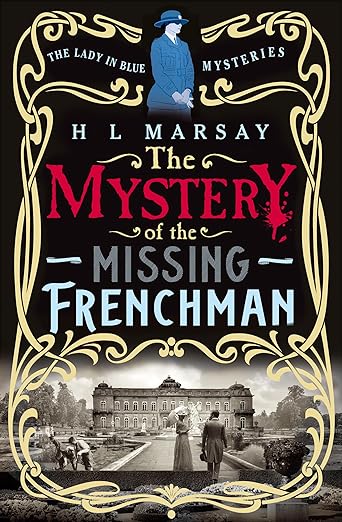Today it is my pleasure to Welcome author H L Marsay to HJ!

Hi H L Marsay and welcome to HJ! We’re so excited to chat with you about your new release, The Mystery of the Missing Frenchman!
To start off, can you please tell us a little bit about this book?:

at Scotland Yard. She is busy investigating a series of jewel thefts, when she is asked to assist
the inscrutable Inspector Derwent and the charming Colonel Lamarchant find a missing
French aristocrat. Their enquiries take them to a country house in Yorkshire, that’s been
converted to a hospital for wounded soldiers and was the last place the Frenchman visited.
However, the more questions they ask, the more questions they have.
When the body of a man suspected of being the French marquis is discovered, Dorothy and
the others return to London, but the dead man is a stranger. Dorothy begins to wonder if the
dead man, the jewel thefts and the missing Frenchman may be connected. She finds herself
tangled in a web of conscientious objectors, Irish republicans and communist agitators, and
not everyone is who they appear to be.
Please share your favorite lines or quote(s) from this book:
One of my favourite parts of the book is when Dorothy is being teased by her brother,
Raymond, who works for Military Intelligence and Inspector Derwent, her boss at
Scotland Yard.
“She did an excellent job. I hope you aren’t thinking of poaching her to work with
you at General Intelligence.”
Dorothy looked at him in surprise. He rarely made a joke.
“No, I think she’s far better suited to Scotland Yard,” replied her brother with a
grin.
“Why couldn’t I work with you?” demanded Dorothy, indignantly. “Didn’t you
tell me that women are being recruited from Royal Holloway and St Hugh’s at Oxford?”
“They are and we ask that they possess intelligence, diligence and above all
reticence, and I’m afraid that’s where you would fall down, Dorothy. No one could ever
accuse you of being reticent, old girl. Wouldn’t you agree, Inspector Derwent?”
“I couldn’t possibly comment, Mr Peto,” replied the inspector and for the first
time Dorothy heard him chuckle.
What inspired this book?
The Lady in Blue Mysteries were inspired by the brave and determined suffragettes
(including my main character, Dorothy Peto) who campaigned for women to be allowed
to join the police. When war was declared in 1914, and so many men left their jobs to
join the army, these women took their chance and set up voluntary patrols. The patrols
were so successful that the women were soon recruited into the regular police.
I got the idea for this book, The Mystery of the Missing Frenchman, when I was
researching the First World War (I lost count of how many books I read and
documentaries I watched!) I was fascinated by how large county houses were turned into
army hospitals and how important military intelligence was when it came to dealing with
foreign spies and also threats on the home front. Gradually, the idea of a mystery
involving a missing foreigner began to grow and I just knew I had to write it.
How did you ‘get to know’ your main characters? Did they ever surprise you?
Unlike the other books I have written, Dorothy, my main character, is based on a real
person. Dorothy Olivia Georgiana Peto was born into a wealthy and well-connected
family. Her grandfather was a baronet and her father was a famous landscape artist.
When war broke out in 1914, she joined the voluntary patrols of women who helped
police the streets of London and other cities. After the war, she went on to become the
first female superintendent at the Metropolitan Police. Luckily for me, when she retired,
she wrote her memoirs. After reading them, I felt like I knew her.
What was your favorite scene to write?
Part of the reason Dorothy finds herself drawn to the charming French colonel is that he
reminds her of her life before the war. I loved writing the scene when they are at a party
in a large country house that has been turned into an army hospital.
“Do you dance, Inspector?” asked Dorothy. The brandy was making her feel
braver than usual.
He hesitated for a second then shook his head. “Sadly, Miss Peto, my dancing
days are over,” he replied as the colonel joined them, smiling broadly.
“Ah, Miss Peto, you have returned at last.” He gave a gracious bow. “May I have
the pleasure of the next dance?”
“I’d be delighted,” replied Dorothy, who had always loved dancing. A second
later, she was in his arms. Before the war, her parents had frequently held parties and
dances for the young people in the area and friends of her brothers and sisters. Being
rather tall, she’d often struggled to find a suitable partner and had often felt a little
awkward, but now as the colonel expertly twirled her across the floor, she felt as light as
one of the snowflakes she’d seen from the courtyard window.“I’m sorry we haven’t found out anything to help us locate the marquis,” she said.
“I hope you don’t think your visit here has been a waste of time.”
He smiled as he looked deep into her eyes. “Miss Peto, how could I possibly think
that when it has allowed me to spend time becoming acquainted with such a beautiful
young lady.”
Dorothy felt a blush creep over her face as she was swept along in his arms. He
really was an excellent dancer. The music changed, but he didn’t let her go. As they
waltzed, he began to tell her about his visit to Monet’s garden, and as he talked and the
music played, for a while she forgot all about the war, stolen jewels and the missing
Frenchman.
What was the most difficult scene to write?
I found the ending, when Dorothy finally realises who has been behind the murders, the
most difficult to write. I don’t want to give anything away, so instead I have included the
last scene from the story. Dorothy and Inspector Derwent have just been told by
Raymond that the Americans have joined the war.
“Surely the war can’t last much longer now.”
“Let’s hope that’s true. It certainly feels like a time to celebrate. Would you care
to join us for a drink, Inspector?” asked Raymond.
“I’d be delighted.”
“Where shall we go?” asked Dorothy as she linked her arm through her brother’s.
“There’s only one place that seems appropriate—the American Bar at the Savoy. I
dare say there will be plenty of others celebrating too but as they have the longest
cocktail bar in London, they should still fit us in.”
“The American Bar it is then,” agreed Dorothy as the inspector took her other arm
and the three of them headed out into the London night.
Would you say this book showcases your writing style or is it a departure for you?
Previously, I have written two other mystery series: The Chief Inspector Shadow
Mysteries, and the Secrets of Hartwell. However, the Lady in Blue Mysteries are the first
time I have written historical fiction. Although they are still mysteries, they involved
much more research. It was also difficult finding the correct voice for each character as I
didn’t want them to sound too modern. Having said that, some of the characters have
very outdated opinions and they were tricky to write too.
What do you want people to take away from reading this book?
First and foremost, I would like them to simply enjoy reading and perhaps solving a
classic mystery. If it also inspires them to find out more about the role Dorothy and other
women like her played during the First World War, that would be wonderful too!
What are you currently working on? What other releases do you have planned?
At the moment, I am writing the next book (number 4) in the Lady in Blue Mysteries. I
think it will be called A Killer in Kensington but that could change! However, my next
release is Book 8 in the Chief Inspector Shadow Mysteries. A Saxon Shadow will be out
in October.
Thanks for blogging at HJ!
Giveaway: An ebook copy of THE MYSTERY OF THE MISSING FRENCHMAN + one additional Tule ebook of the winner’s choice
To enter Giveaway: Please complete the Rafflecopter form and Post a comment to this Q: As I said before, spending time with Colonel Lamarchant reminds Dorothy of her life before the war. If you could return to a time in your past, when would you choose?
Excerpt from The Mystery of the Missing Frenchman:
“Sergeant Taylor, I really don’t think she knows anything,” insisted Dorothy as the young maid in the chair next to her sobbed loudly into her apron. Sergeant Taylor frowned as he continued to pace up and down in front of them, his hands clasped behind his back. The hulking figure of Sergeant Brook with his bushy beard was also lurking in the corner, although he remained silent. Personally, Dorothy thought they would have had far more success if she had been allowed to interview the maid alone, or perhaps with the assistance of Sergeant Clark, the older detective they worked with. His grumpy but grandfatherly manner would surely have been an improvement on the shouting and threats coming from Taylor. However, she had kept these thoughts to herself. She knew she was lucky they had even allowed her to be present while they interviewed the female witnesses.
She had been working with this group of detectives, under the leadership of Inspector Derwent, for several months now and she could hardly believe her good fortune. When war first broke out, she—along with Nina Boyle, Mary Allen and Margaret Damer Dawson—had founded the Women Police Volunteers or Women’s Police Service as it was now known. However, traffic duty and training new recruits, although important, had soon lost their appeal compared to solving more serious crimes.” Quite by chance she had assisted Inspector Derwent during two murder investigations and had been thrilled when he had requested that she was seconded to Scotland Yard permanently.
On the whole, the three male sergeants had taken a young woman joining them in their stride. They understood that with so many young men leaving the police to go and fight for their country, the empty roles needed to be filled by someone. If there weren’t enough old detectives willing or able to come out of retirement, then these eager young women would have to do. For her part, Dorothy had soon grown accustomed to her new colleagues and their individual quirks. Sergeant Clark had agreed to delay his retirement when war broke out. He was ruled by his stomach and planned his days around tea breaks and mealtimes. Calm and unflappable, he enjoyed grumbling quietly to himself or Dorothy about almost everything, from the weather, to how the war was going. Brook and Taylor were both family men in their late forties, who hoped the war would be over before either of their sons were old enough to fight. Despite Brook’s slightly threatening appearance, Dorothy believed he had a kind heart. Although so far, he had only spoken precisely thirty-two words to her, he’d always helped when she’d asked him. Taylor was slighter and shorter than Brook but took great pride in his appearance. He was enamoured of everything modern from the police cars he loved to drive at high speed, to the new telephone system that had recently been installed.
Their boss, Inspector Derwent, was far more difficult to understand. He was in his fifties, tall with dark, slightly greying hair and walked with a stick thanks to an injury he had gained during the Boer War. Despite working closely with him, Dorothy still knew very little about his private life.
What she did know was that all her colleagues were irritable and frustrated at the moment. During the previous summer and early autumn, they had been investigating a spate of jewel thefts in and around the capital. The first had occurred in Kensington, the next in Belgravia , followed by two out in Surrey. Then over the long, cold winter, there had been a lull. It was as if the jewel thief had vanished into thin air. That was until ten days ago.
Lady Rimington had been staying with her niece, Mrs Adele Devere, in Mayfair. Mr Devere was a wealthy industrialist. There had been a dinner to celebrate Lady Rimington’s sixtieth birthday. By all accounts it had been a very grand affair. However, when the guest of honour had woken up the following morning, she’d realised her diamond tiara was missing from her dressing room. Like all the other thefts, the stolen jewels were extremely valuable and had been taken without any visible signs of a break-in. All doors and windows were locked from the inside and the jewels had disappeared while the occupants were sound asleep.”Excerpt From
The Mystery of the Missing Frenchman
H L Marsay
This material may be protected by copyright.
Excerpt. © Reprinted by permission. All rights reserved.
Book Info:
Inspired by the remarkable life of Dorothy Peto, the Metropolitan Police’s first female superintendent.
Even in war, your enemies can linger too close to home…
While war and revolution continue to ravage Europe, Dorothy Peto embraces her new role at Scotland Yard as she and several detectives investigate a series of jewel thefts. Then Dorothy is tasked with assisting the inscrutable Inspector Derwent and the charming Colonel Lamarchant to find a missing French aristocrat. Their enquiries take them to a country house in Yorkshire, that’s been converted to a hospital for wounded soldiers and was the last place the Frenchman visited. However, the more questions they ask, the more questions they have.
When the body of a man suspected of being the marquis is discovered, the investigative team returns to London, but the dead man is a stranger. Dorothy speculates that the death, the jewel thefts and the missing Frenchman may be connected. She finds herself tangled in a web of conscientious objectors, Irish republicans and communist agitators, and not everyone is who they appear to be.
Book Links: Amazon | B&N | Kobo | Google |
Meet the Author:
H L Marsay grew up binge-reading detective stories and promised herself that some day, she would write one too. A Long Shadow was the first book in her Chief Inspector Shadow series set in York. Luckily, living in a city so full of history, dark corners and hidden snickelways, she is never short of inspiration. She has also written The Secrets of Hartwell Trilogy and The Lady in Blue Mysteries. The Chief Inspector Shadow Mysteries have recently been optioned for television.
When she isn’t coming up with new ways to bump people off, she enjoys drinking red wine, eating dark chocolate and reading Agatha Christie – preferably at the same time!
Website | Facebook | Twitter | Instagram | GoodReads |


erahime
Childhood.
janinecatmom
I would choose my carefree teenage years.
bn100
no idea
debby236
I would go back to when I stated my own family. We had so much fun.
Texas Book Lover
I’m not sure if I would go back to any time. I really like where I am now!
Mary C
Back to a time when my parents, grandparents and brother were with us.
Amy R
If you could return to a time in your past, when would you choose? I would like a time when I could see my grandparents
psu1493
I would go back to when I was in college.
Bonnie
I would return to the 1980s.
glendamartillotti
I’d go back to early day of my marriage when the kids were little
Patricia Barraclough
I would like to go back to my mid-20’s when I was in the Peace Corps. I was free to be myself and explore the world.